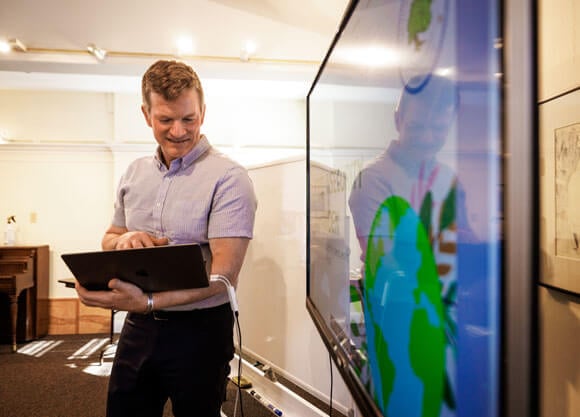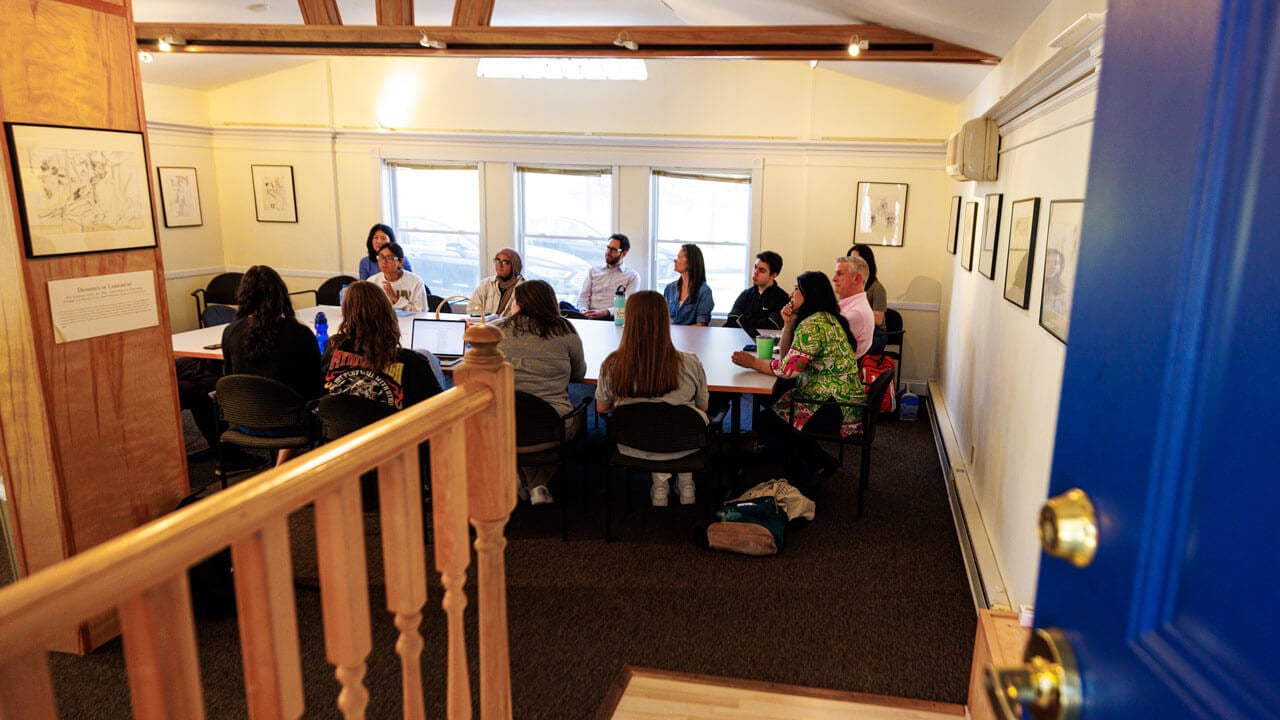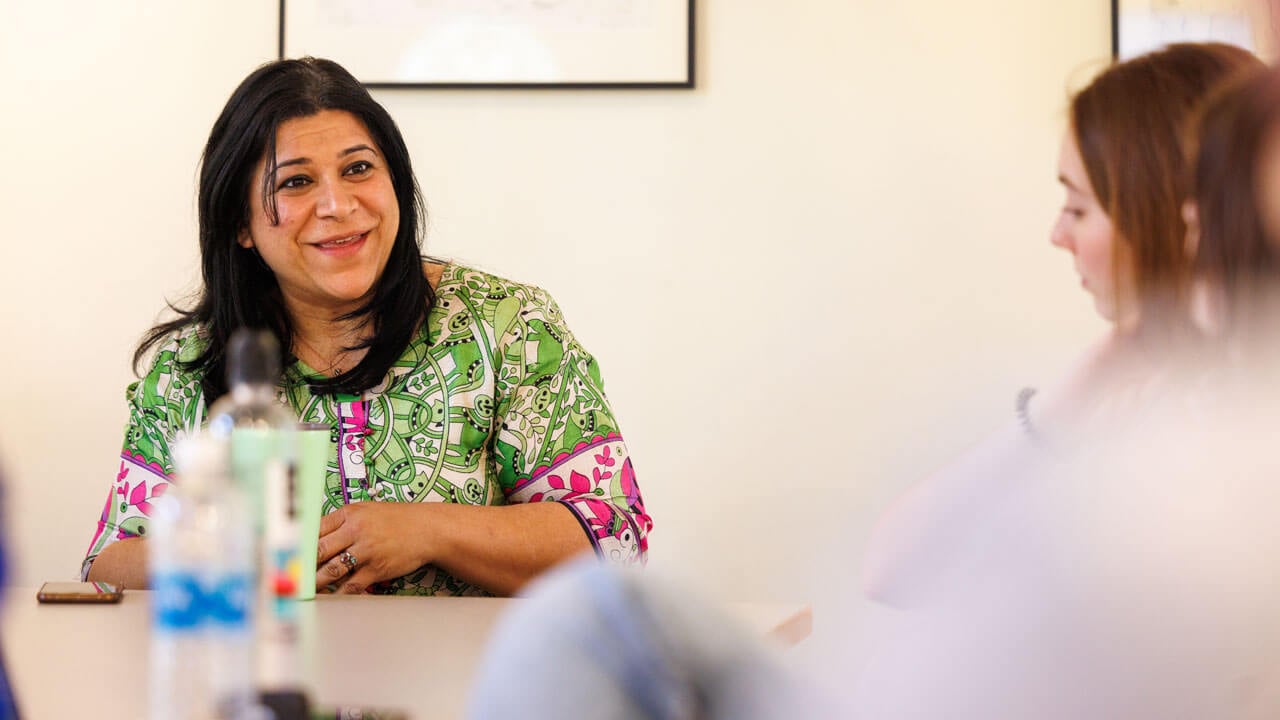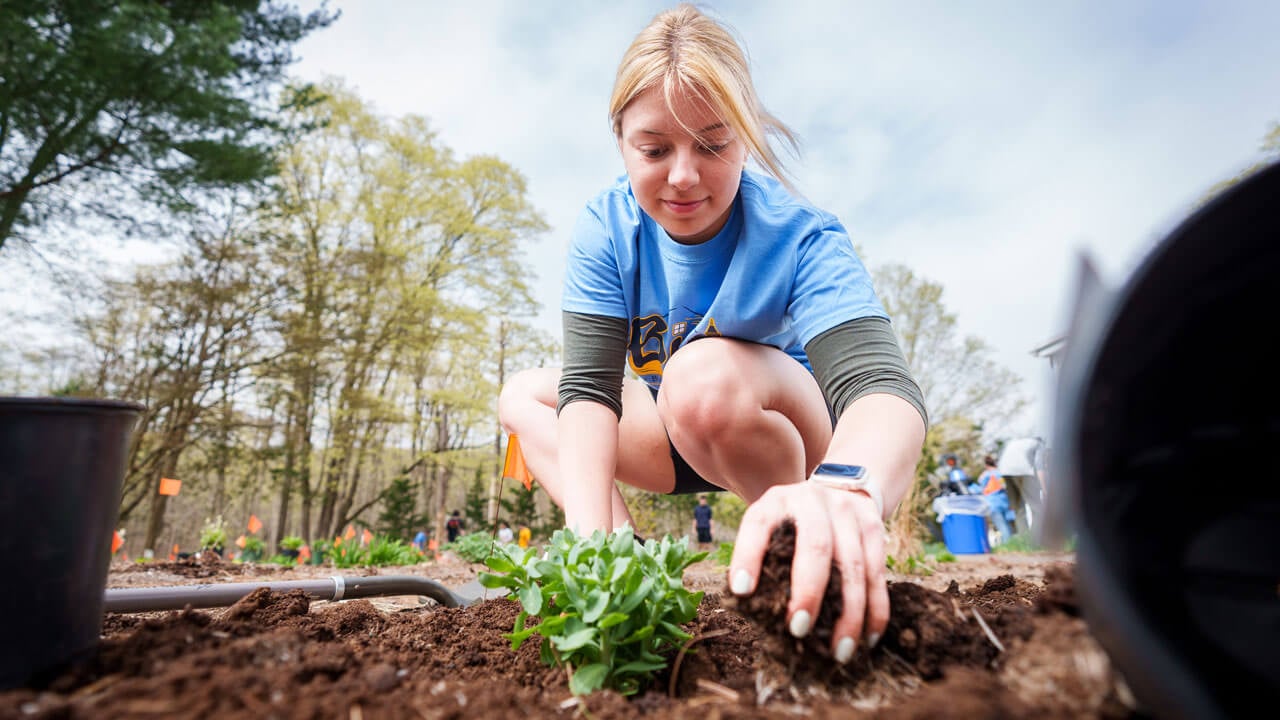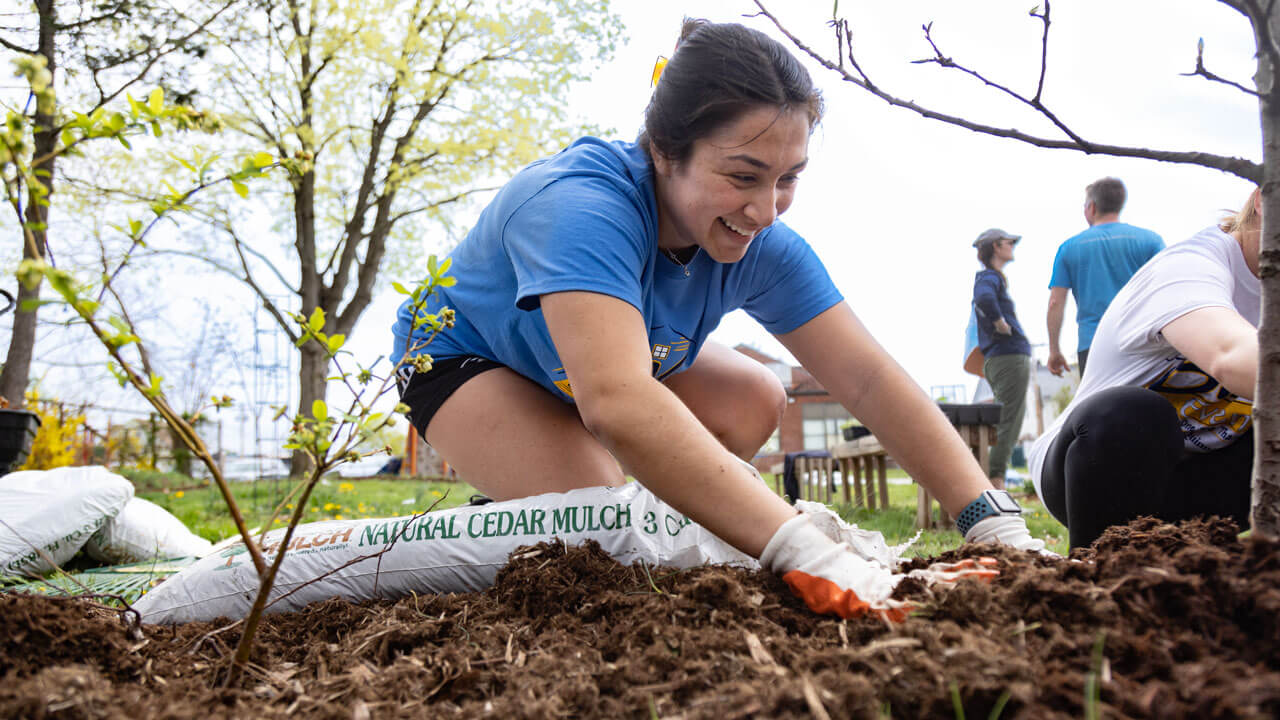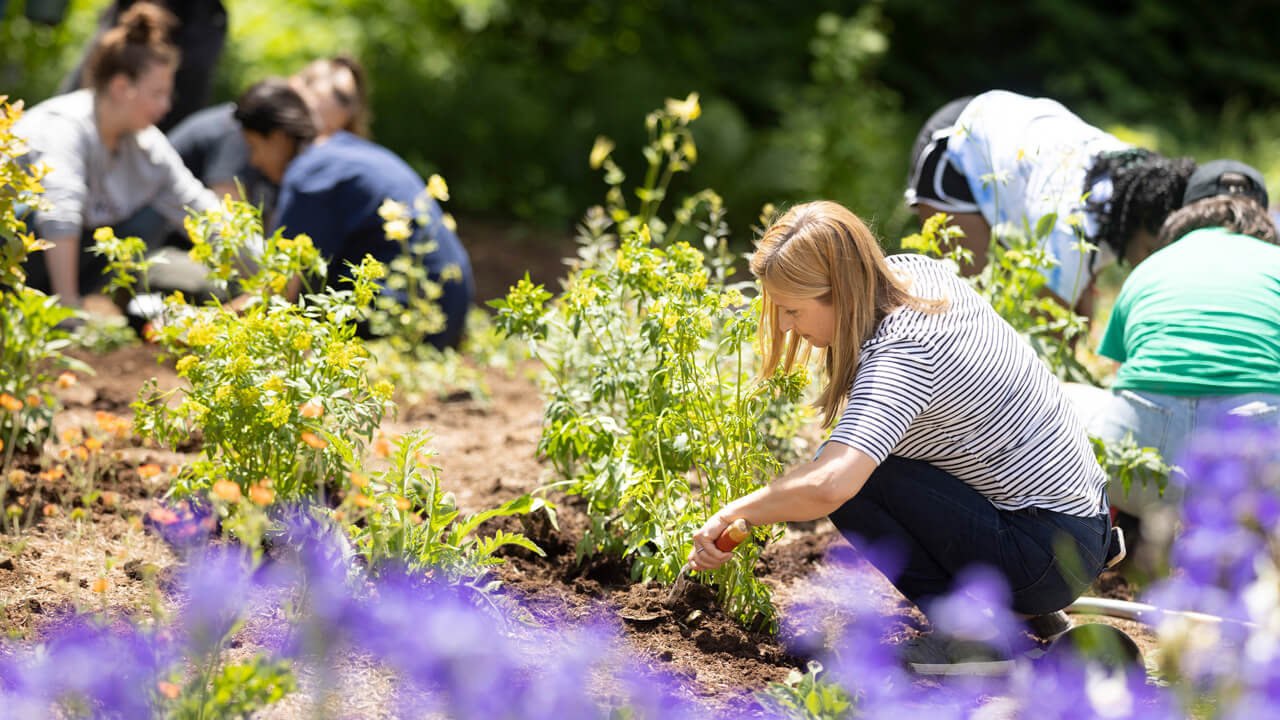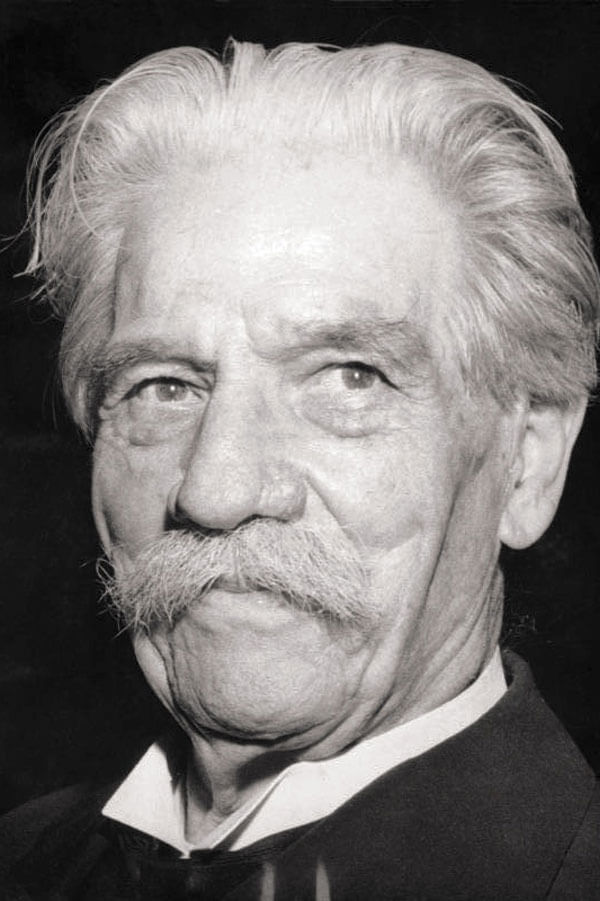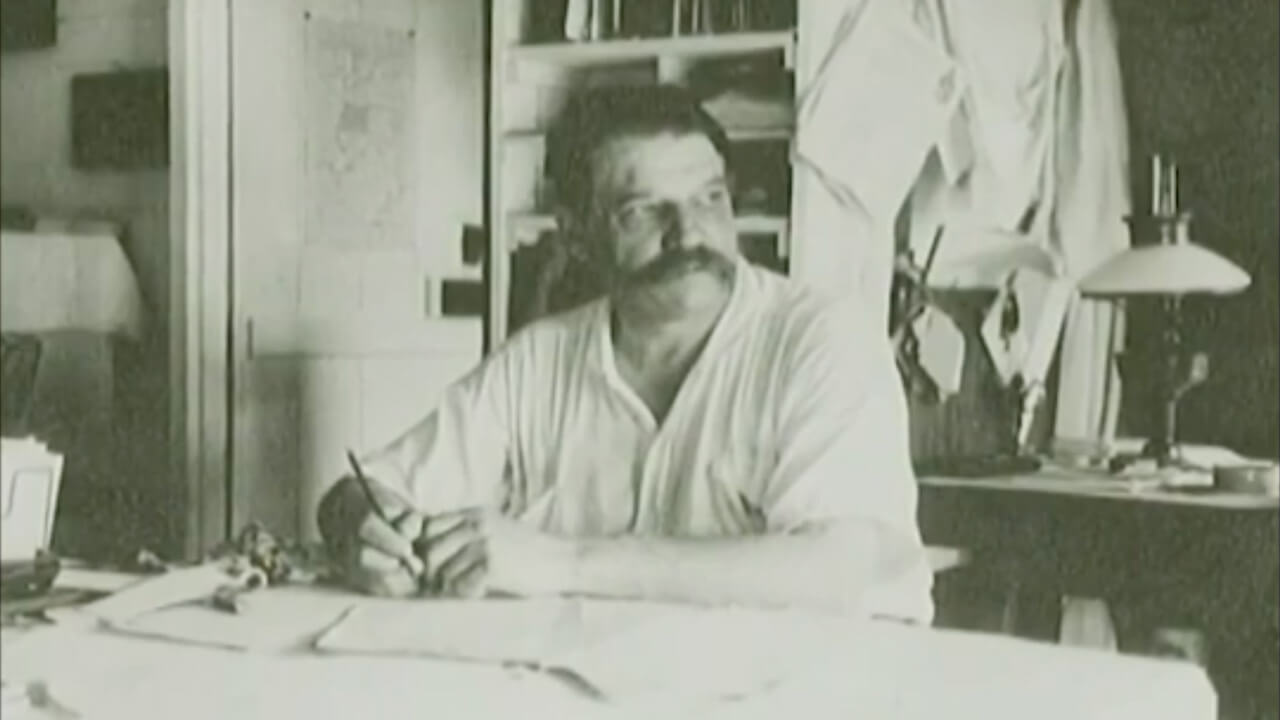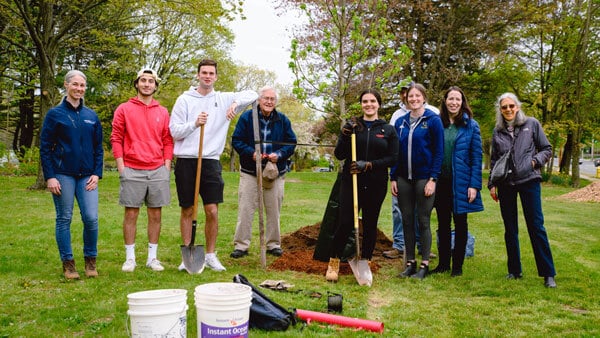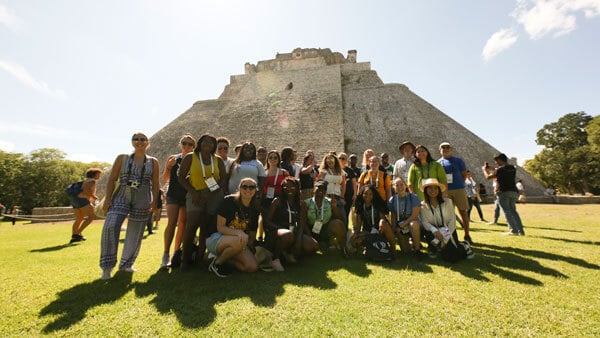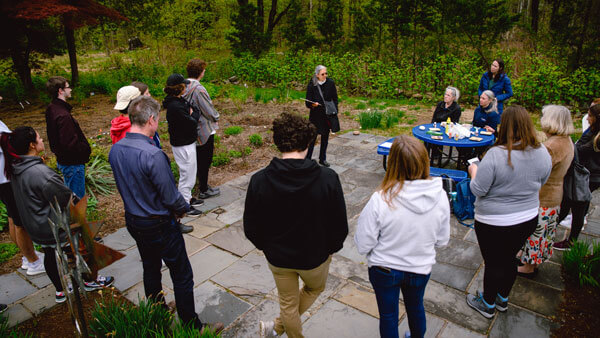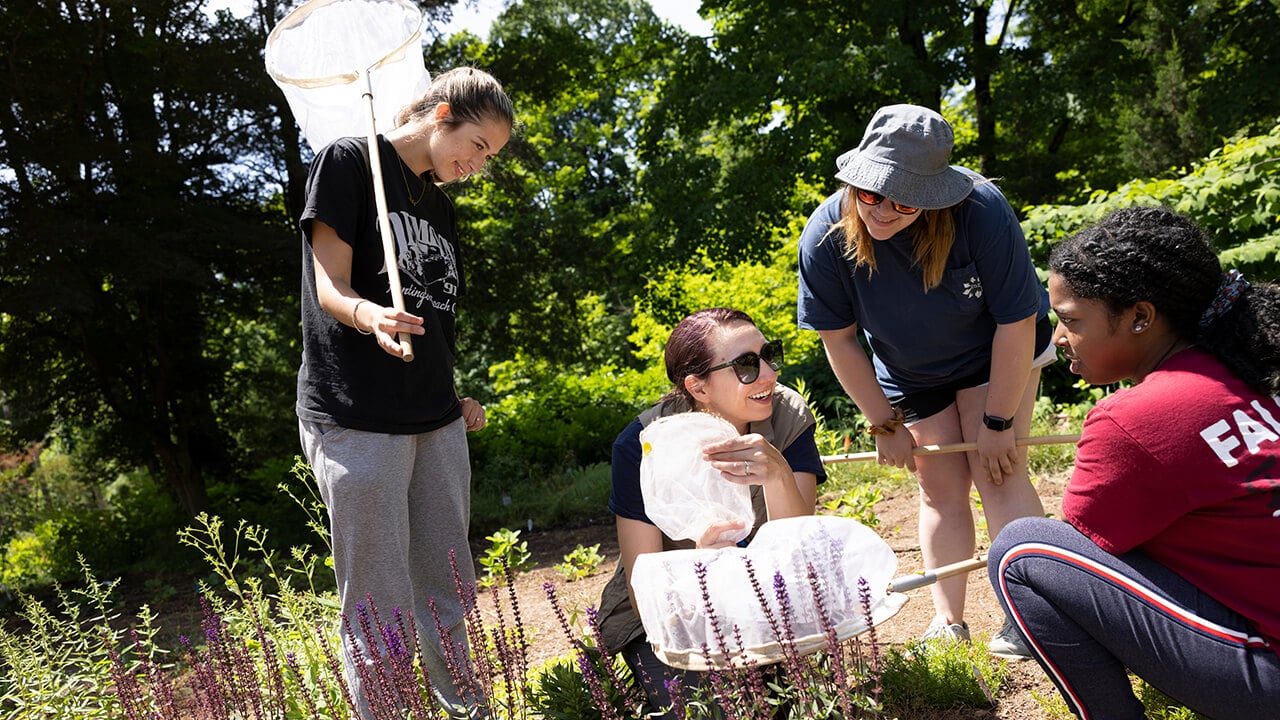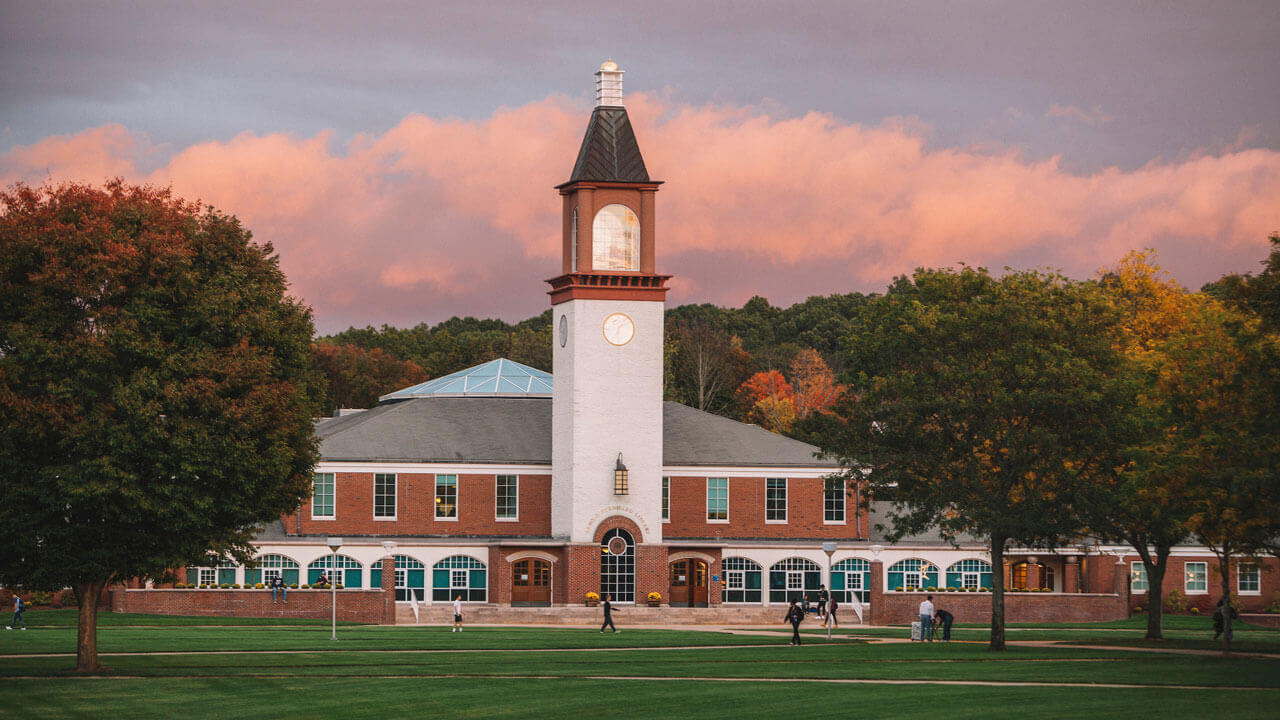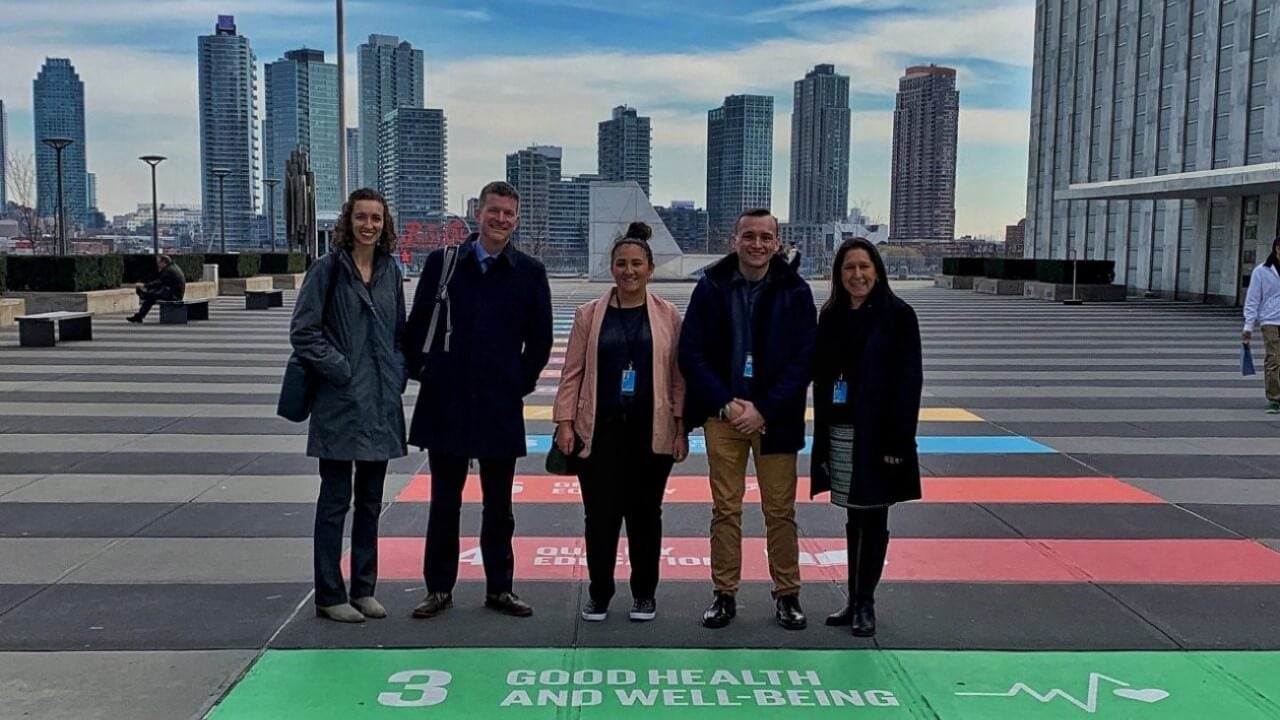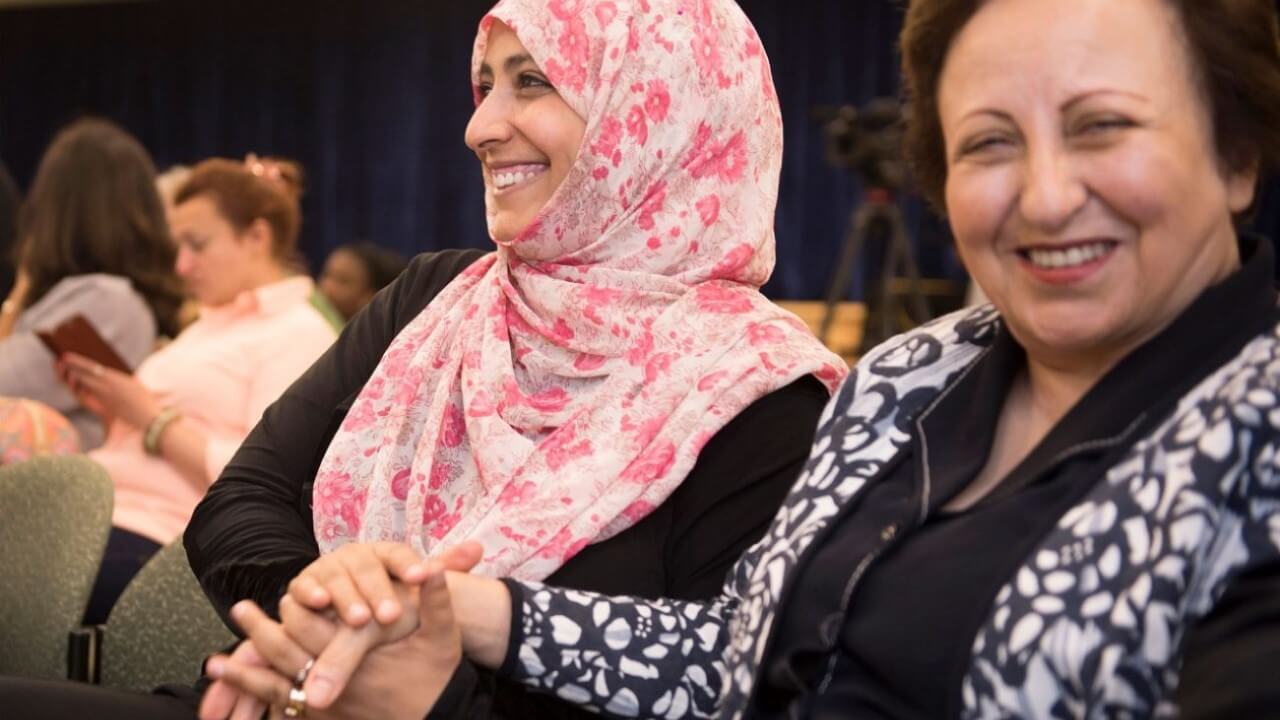The institute has collaborated with other actors on campus since the fall of 2019 in a multi-year project exploring relationships between Quinnipiac University and the natural, cultural and indigenous history of the land we call home. We are reaching out to the Native peoples of the region as we explore what it means to be responsible custodians of the name Quinnipiac.
Frequently Asked Questions
Who are the people called the Quinnipiac?
The Quinnipiac are the Indigenous inhabitants of this region who spoke an eastern dialect of the Algonquian language family. Prior to European contact in the early 1600s, their territory covered 300 square miles along the Atlantic shoreline which includes today’s towns of New Haven, East Haven, West Haven, Hamden, North Haven, Branford, Guilford, Madison, Meriden, Cheshire, Wallingford and portions of Bethany and Woodbridge. Prior to contact with the Europeans and the devastating impact of the diseases that they brought with them, it is estimated that the population in this region could have been as high as 30,000.
Historical accounts and archaeological investigations indicate that the Quinnipiac moved between seasonal camps along the coast during the warmer months and sites farther inland during the cooler seasons. They farmed corn, beans and squash, collected shellfish, gathered wild plants and hunted fowl, rabbits, beaver, deer and turkey. They were known for making beautiful basketry and pottery and produced wampum beads traded throughout the northeast from locally available quahog shells. These beads were used for storytelling, ceremonial events and making treaties. They also produced stone tools for hunting and defense from locally plentiful quartz and quartzite sources. The Quinnipiac lived in wigwams and used elm bark canoes for travel, trade and warfare. The area known today as New Haven was a key junction for one of the many interconnected foot trails that connected Indigenous people, and later European colonists, throughout the northeast. In fact, Routes 1, 10 and 5 follow the routes of these original trails.
Composed by Julia Giblin from John Menta’s book, “The Quinnipiac: Cultural Conflict in Southern New England” (2005).
What is settler colonialism and how has it affected the Quinnipiac?
The term “settler colonialism” refers to an ongoing process of elimination and erasure of Native peoples in favor of a society based in the history and culture of a settler people, most often of European origin. This process — and the power relationships inherent to it — are characteristic of “settler societies” such as the United States, Canada, Australia, New Zealand, Israel and South Africa as well as many in South and Central America. The process is characterized by ongoing policies and actions that result in the dispossession, extermination and assimilation of the Native peoples of a land and the appropriation of Native culture and resources; such practices erase Native histories and cultures and reserve land, resources and power for members of the settler society.
Consider how the process of erasure has affected the Quinnipiac: During the early 17th Century, the Quinnipiac were trading partners with the Dutch, who called them the Quiropy. Decades later, the prominent leaders Montowese, Momauguin and Shaumpishuh greeted English settlers who established a settlement at Quinnipiac, later renamed New Haven. With the acceleration of English colonization after the Pequot War, the Quinnipiac community removed to what may be New England's first Native American reservations in Mioonkhtuk (East Haven), Totoket (Branford), Menunkatuck (Guilford) and part of Quinnipiac proper (North Haven). After much land loss in the 18th Century, some community members were moved to Waterbury or merged with either the Paugussett or the Tunxis in Farmington before migrating westward in the Brothertown movement. Other Quinnipiac remained in Connecticut, living and working in shoreline towns, sometimes selling baskets or other Indian wares. The Quinnipiac are not presently one of Connecticut's recognized tribes nor do they have government-to-government relations with the federal government.
As an institution of higher education, Quinnipiac University is not immune from the dynamics of settler colonialism. Through our Indigeneity Initiative, we are attempting to address our role in the ongoing dynamic of settler colonialism in American society and culture and to reverse the historical and contemporary erasure that has resulted.
This very short description of the history of the Quinnipiac was taken from Native Northeast Portal.
For more on Settler Colonialism, check out this entry by Alicia Cox in Oxford Bibliographies.
Why are we called “Quinnipiac” University?
The institution we now know as Quinnipiac University was founded in 1929 as the Connecticut College of Commerce. In 1935, the name was changed to the Junior College of Commerce (JCC); the College conferred 2-year degrees.
In 1950, the Board of Trustees voted in favor of conferring 4-year (bachelor’s) degrees and made an application to the CT Board of Education to effect this change of status. We admitted our first class of students for these degrees in September of 1950. Because we would no longer be a “junior college,” the institution also proposed a new name. Several names were suggested by students, faculty and alumni at the time — among the finalists under consideration were “Nathan Hale College,” “Ronan College,” “The College of Arts & Commerce” and “Quinnipiac College.” As reported in the JCC Chronicle, Quinnipiac was most favored in a poll of faculty, alumni, students and trustees. At the time, it was known that “Quinnipiac” was the name of the people who had long made this region their home and was the first name of the settlement that became New Haven (which is where the JCC was founded).
In the spring of 1951, the JCC became Quinnipiac College when the CT Board of Education certified it to grant 4-year degrees. This change was celebrated with a day of festivities known as “Quinnipiac Day” and attendees of the College became known as the “Braves.”
How can I find out more information about the Quinnipiac people and their connections to this place?
-
For a more complete history of the Quinnipiac tribe, see John Menta’s, “The Quinnipiac: Cultural Conflict in Southern New England” (2005).
-
For a broader introduction to Indigenous tribes of CT, check out: Lucianne Lavin’s “Connecticut's Indigenous People” (2013).
-
For a comprehensive database of historical documents and biographies related to the Quinnipiac and other Indigenous people in New England, explore the Native Northeast Research Portal.
-
Take some classes! AN233: Practicing Archaeology and HS340: Native American History are two courses offered at Quinnipiac that explore these themes in depth.
-
Join a campus group that explores Indigeneity within our campus community such as the Indigenous Student Union and Quinnipiac's Indigeneity Initiative.
-
To explore additional library resources check out these comprehensive library research guides:
-
To hear student perspectives on our relationship to this place and the name Quinnipiac, check out the Anthrophiles podcast (specifically episodes 7 and 21).
-
The Quinnipiac Chronicle has written several great articles over the years addressing our name and the history of the university in relation to Indigenous peoples.
What is a Land Acknowledgment?
Land acknowledgment is a custom rooted in many Indigenous traditions. Today it is used by Native Peoples to sustain their connection and sense of belonging to ancestral homelands and by non-Natives (from individuals to institutions) to recognize the original stewards of the land where people currently live and work. You may have heard a teacher or student leader read a land acknowledgment before starting a class or at the beginning of an event that acknowledges the Quinnipiac people, among other groups in the region.
While individuals may have developed their own statements, currently Quinnipiac University does not have an official land acknowledgment statement like some other universities do. Developing a land acknowledgment is an important process that must be done thoughtfully through genuine respect, support and reciprocity with Indigenous communities. Our campus community is at the beginning stages of working towards the goal of advancing racial justice in relation to Indigenous recognition (see point 8 of Quinnipiac University’s 10-point plan).
“Making a land acknowledgment should be motivated by genuine respect and support for Native Peoples. Speaking and hearing words of recognition is an important step in creating collaborative, accountable, continuous, and respectful relationships with Indigenous nations and communities.”
Quote from the National Museum of the American Indian website
Why doesn’t the university have an official Land Acknowledgment statement?
Those of us involved in the Indigeneity Initiative at Quinnipiac — faculty, students and staff acting on the advice of many generous Native consultants — have committed ourselves to developing a Land Acknowledgment that is rooted in meaningful work at our university that seeks to undo the most pernicious effects of settler colonialism in our community. This work must go beyond simple acknowledgment by making visible the many erasures of Native peoples and cultures that our society has promulgated for the last 500 years and by developing strong and meaningful relationships with the peoples and cultures and places that continue to define this region. When we have created an official land acknowledgment, it will be one that recognizes our ties to this place in all its current and historical complexity: landscape, cultures, peoples and all other living inhabitants.
Welcome to this place, this community that we call Quinnipiac!
Welcome to our three campuses where you will spend your time in the next few years — the places we call “York Hill” and “Mount Carmel.”
Each of these places has had meaning for the European settlers who gave them these names; you will make your own meanings here.
Welcome also to this land of the Sleeping Giant, defined by the natural area that rises next to our campuses and welcomes and protects us.
This landscape has had meaning for the peoples who have called this area home for millenia. Some of these peoples have also been known by the name “Quinnipiac.”
We invite you to join us as we explore these meanings and this place through time and for all the peoples who have called this place home as you make this your own home for a while.
We invite you to learn of the past and to appreciate the contributions and stewardship of the Southern Algonquian peoples who have been here for time immemorial.
We invite you to join us as we reach out to and learn from the two federally-recognized and three state-recognized peoples of Connecticut as well as the many other Algonquian people spread across the country and globe who are thriving and continue to pass on their knowledge and appreciation of this place that you have come to. Among them, the Mohegan, Mashantucket Pequot, Eastern Pequot, Schaghticoke, Golden Hill Paugussett, Niantic, Stockbridge-Munsee and Brothertown Indian Nations and peoples.
Join us at the Indigenous Student Union, come to one of our events or seek out the Albert Schweitzer Institute and join the students, faculty and staff who are curious about our connections to the indigenous world around us.
But most of all, welcome!


